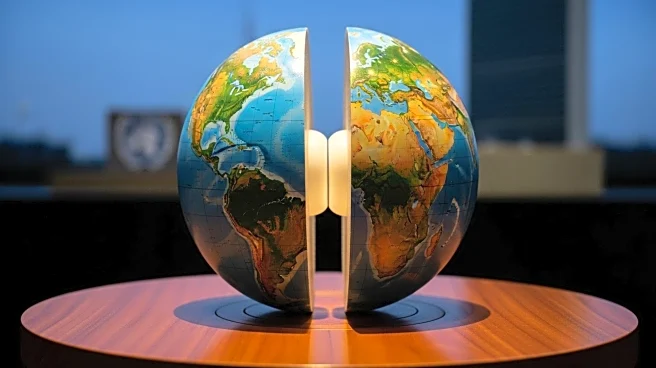What's Happening?
Portugal's Minister of State and Foreign Affairs, Paulo Rangel, addressed a High-level International Conference at the United Nations headquarters in New York City, advocating for the peaceful settlement of the Palestinian question through the implementation of a two-state solution. This conference, held on July 29, 2025, brought together international leaders to discuss strategies for achieving peace between Israel and Palestine. Rangel emphasized Portugal's commitment to supporting efforts that align with the European Union and United Nations' stance on the two-state solution, which aims to establish a sovereign Palestinian state alongside Israel.
Why It's Important?
The endorsement of the two-state solution by Portugal at a UN conference highlights the ongoing international efforts to resolve the Israeli-Palestinian conflict, a longstanding geopolitical issue. This approach is seen as a viable path to peace, aiming to address territorial disputes and ensure security for both nations. Portugal's support adds to the collective pressure on both parties to engage in constructive dialogue and negotiations. The involvement of EU member states like Portugal underscores the importance of multilateral diplomacy in addressing complex international conflicts, potentially influencing U.S. foreign policy and its role in Middle Eastern peace processes.
What's Next?
The conference may lead to renewed diplomatic efforts and discussions among international stakeholders, including the EU and UN, to facilitate negotiations between Israel and Palestine. Portugal's active participation could encourage other nations to reaffirm their commitment to the two-state solution, potentially leading to new initiatives or peace talks. The U.S., as a key player in Middle Eastern politics, may also face increased pressure to support or mediate these efforts, impacting its diplomatic relations in the region.
Beyond the Headlines
The advocacy for a two-state solution reflects broader ethical and cultural dimensions, as it seeks to address human rights concerns and promote coexistence between diverse communities. The international community's involvement highlights the importance of collective action in resolving conflicts that have significant humanitarian implications. Long-term shifts may include increased international cooperation and a focus on sustainable peace-building strategies.









